Quinn Hughes came just short of winning the Calder Trophy as rookie of the year, earning 53 first-place vots and 111 second-place votes.
He wasn’t the only Canuck to earn votes for the NHL awards, though. Three other Canucks also showed up in the voting for the various awards: Elias Pettersson, Jacob Markstrom, and J.T. Miller. Let’s look at the voting reports that have been released now that the winners of each award have been announced.
We’ll start with the Vezina, where Markstrom came the closest to actually making the top-three for one of the awards. Markstrom finished fourth in Vezina voting after a superlative season for the Canucks where he was named the team’s MVP.
That said, he was a distant fourth. Players earn 5 points for a first-place vote, 3 points for a second-place vote, and 1 point for a third-place vote. Markstrom earned 7 points, finishing just a bit behind Andrei Vasilevskiy of the Tampa Bay Lightning in third place with 31 points.
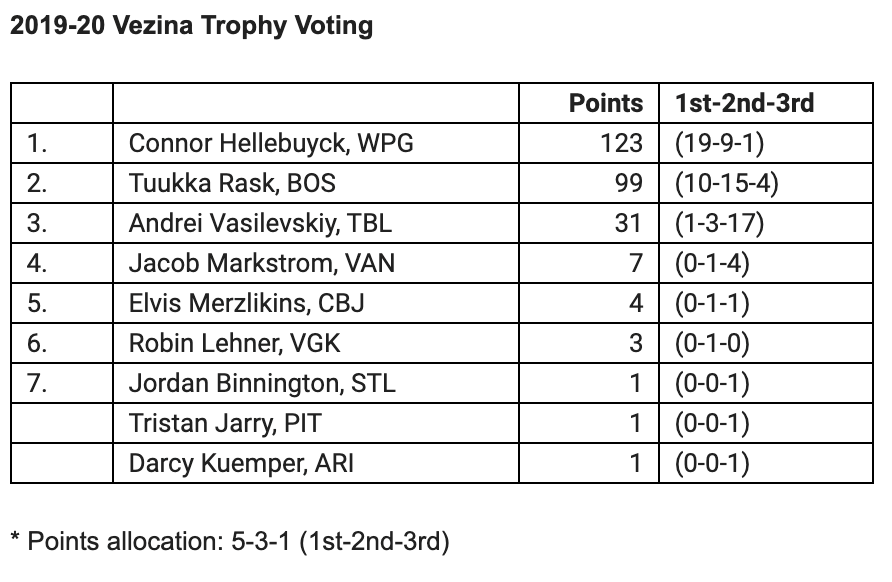 Vezina Voting 2019-20
Vezina Voting 2019-20Markstrom received one second-place vote and four third-place votes, but that’s still a solid result. No one was going to overtake Connor Hellebuyck, who had an incredible season with the Winnipeg Jets.
Meanwhile, whoever gave a third-place vote for Jordan Binnington, who was 27th in save percentage among the 57 goaltenders with at least 20 games played — the very definition of average — needs their head examined. I’ll hazard a guess as to how they came up with that vote: Binnington finished third in wins this season behind Vasilevskiy and Vezina winner Connor Hellebuyck.
Next up is the Norris for the league’s best defenceman. Hughes finished tied for 15th with Shea Weber in the voting for the awards, receiving three fifth-place votes, which isn’t bad at all for a rookie defenceman. What’s a little alarming is who finished ahead of him in the voting: Tony DeAngelo of the New York Rangers.
 Norris Voting 2019-20
Norris Voting 2019-20DeAngelo tied Hughes with 53 points this season and had 15 goals, but he’s secretly a disaster defensively. Or, rather, not-so-secretly after an ugly performance in the postseason this year. But he was fourth in points among defencemen this season, finishing ahead of Hughes since goals are the tiebreaker. I’m not saying that’s why someone gave him a fourth-place vote, but I’m not not saying it.
Then there’s the big one: the Hart Trophy for the most valuable player in the NHL. Leon Draisaitl won the award after leading the NHL in scoring, though it should be said that his teammate and frequent linemate, Connor McDavid, finished second in scoring. Is Draisaitl or McDavid more valuable for the Edmonton Oilers?
There are strong arguments to be made for Artemi Panarin, who tied for third in scoring with 95 points in 69 games, with the next best Ranger scoring 75 points, or for Nathan MacKinnon, who had 93 points, 43 points more than the next best member of the Colorado Avalanche.
Instead, MacKinnon and Panarin finished second and third behind Draisaitl. Meanwhile, three different Canucks got at least one vote for the Hart.
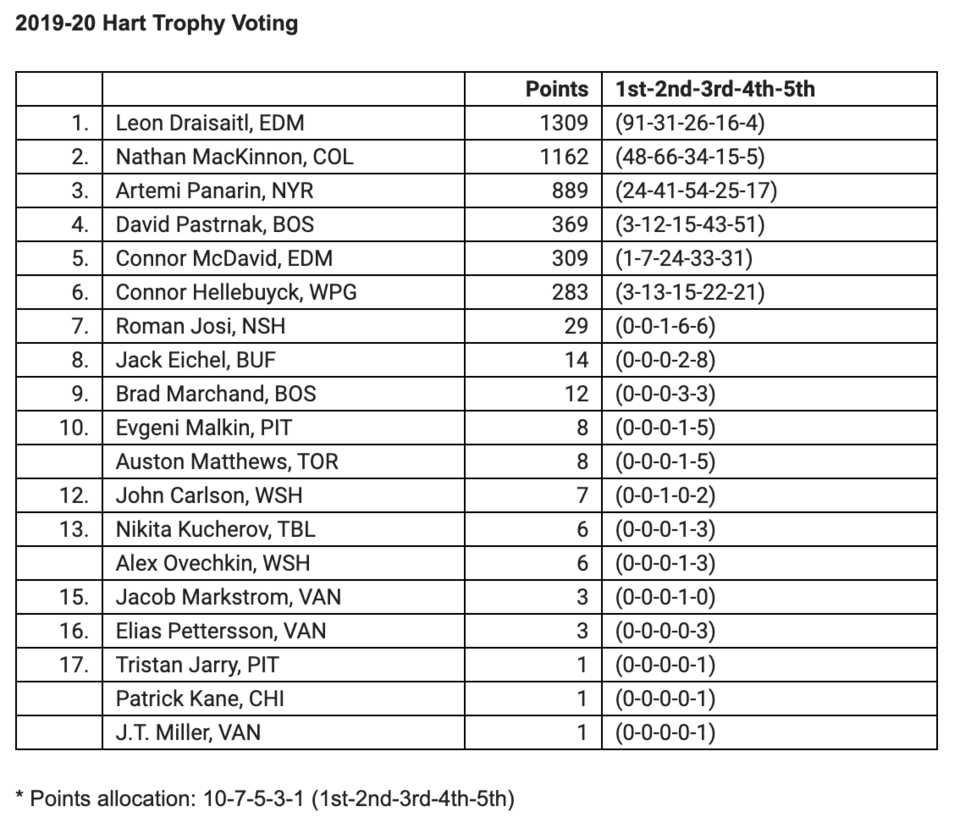 Hart Voting 2019-20
Hart Voting 2019-20That’s all fine and dandy. There are arguments for Draisaitl, MacKinnon, and Panarin. There’s a really good argument for Hellebuyck, who carried the Jets like an aircraft carrier. It’s intriguing seeing hree different Canucks show up in the Hart vote. Clearly, members of the PHWA see three different players as the Canucks’ MVP.
Markstrom received one fourth-place vote for the Hart. The logic behind that vote is likely based in the quality of shots the Canucks gave up this season. Markstrom got a little buzz as a Hart candidate back in February, but it never developed beyond a low hum.
Elias Pettersson arguably deserved a lot more than the three fifth-place votes he received, but that argument involves a lot of fancy stats. For instance, Evolving Hockey’s goals above replacement (GAR) model had Pettersson as the second-most valuable player in the entire NHL this season behind Panarin.
Finally, there’s J.T. Miller, who got one fifth-place vote for the Hart. You can see the logic in that: Miller was the new arrival to the Canucks and led the team in scoring as they made the playoffs for the first time in five years. It’s understandable why someone would give Miller a big chunk of the credit for that and give him a Hart vote.
Miller also got a vote for another trophy that was given out before Monday’s awards show: the Selke.
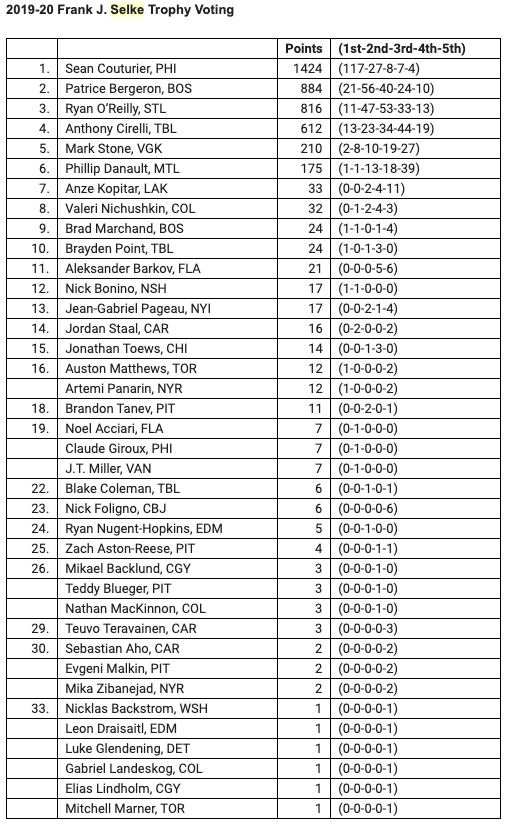 Selke Voting 2019-20
Selke Voting 2019-20The list of Selke vote-getters is always a long one, as there’s no clearly-defined and agreed-upon way to measure defence. It frequently just goes to the top scorer in a particular season among a set group of forwards that have a reputation for playing good defence. Ryan Kesler won the Selke in 2011 more because he scored 41 goals than because he was incredible defensively that season and, in fact, Manny Malhotra took on more of the checking duties than Kesler did.
All that said, Miller getting a second-place vote this season for the Selke trophy is certainly a choice. Miller started 70.74% of his shifts in the offensive zone, wasn’t matched up against top lines any more than league average, and was 7th among Canucks forwards in average ice time on the penalty kill, so giving him any vote for best defensive forward in the NHL is a stretch, let alone a second-place vote.
So, how did he get that vote? Here’s my theory: if you click on the NHL statistics page and sort by faceoff winning percentage, guess who had the second-best percentage in the NHL behind Selke winner Sean Couturier? Yep, J.T. Miller.
While I sincerely hope a writer didn’t just look at faceoff statistics and decide that a 59.2% faceoff percentage means Miller is a defensive stalwart, I also can’t dismiss the possibility.
Finally, there are the First and Second All-Star Teams. Much like the other NHL Awards, these end up playing an outsized role in future NHL Hall-of-Fame selections. Being named the best or second-best player at your position for a season certainly helps your resume.
Hughes was named to the All-Rookie Team, but no Canucks landed on either the 1st or 2nd All-Star Team. Hughes, Pettersson, Miller, and Markstrom all got some votes, however.
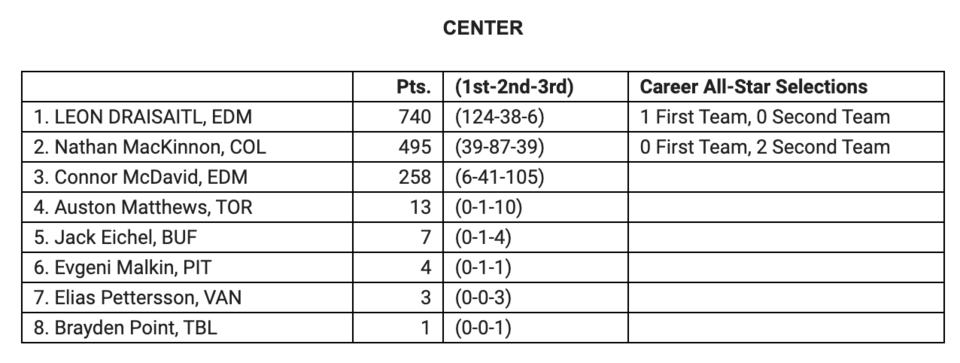 All-Star Team Center Voting 2019-20
All-Star Team Center Voting 2019-20Pettersson landed seventh among centers with three third-place votes, between Evgeni Malkin and Brayden Point. That’s pretty good company for Pettersson, who is likely hard at work as you read this making sure he’s at the top of this list next season.
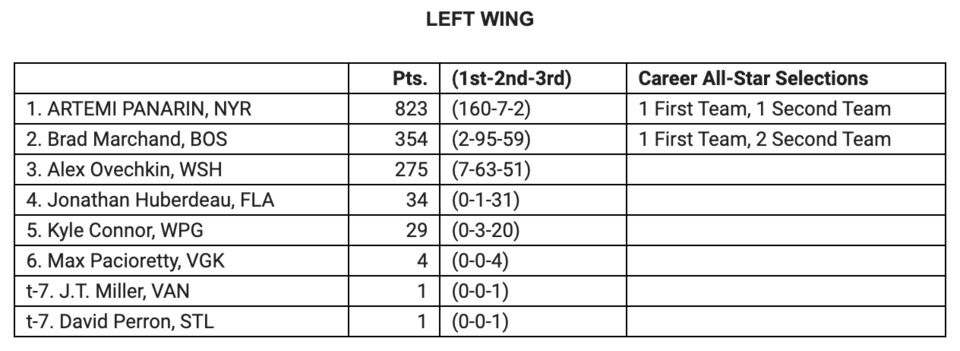 All-Star Team Left Wing Voting 2019-20
All-Star Team Left Wing Voting 2019-20At left wing, Miller garnered just one third-place vote, which seems fair. He arguably deserved to finish ahead of Max Pacioretty, but the left wing position was pretty stacked against him. Panarin was the obvious First Team All-Star, but Brad Marchand, Alex Ovechkin, Jonathan Huberdeau, and Kyle Connor were all fantastic, with an argument for each of them to get the nod as Second Team All-Star.
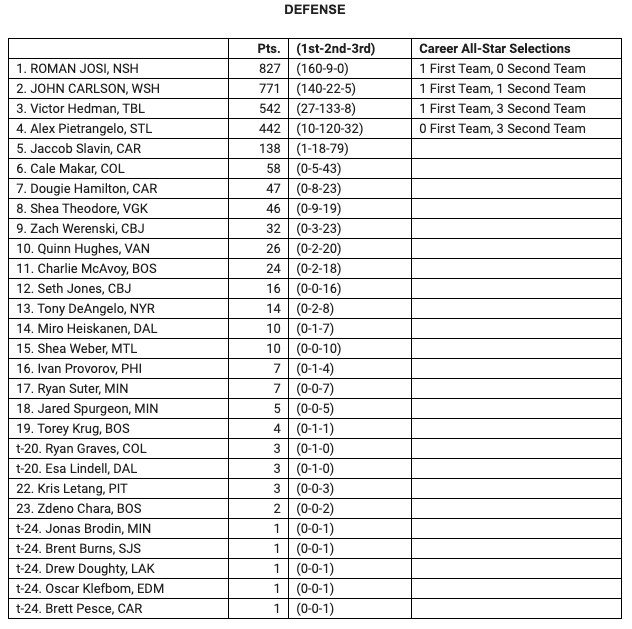 All-Star Team Defense Voting 2019-20
All-Star Team Defense Voting 2019-20It may seem confusing that Hughes got more votes for the All-Star Teams than he did for the Norris, since the PHWA votes for both. That’s because, unlike the other positions, the PHWA votes for two defenceman for each team and votes for three teams for a total of six defencemen.
While Hughes received just three fifth-place votes for the Norris, he got two second-place votes and 20 third-place votes for the All-Star Teams. That’s still a little confusing, as it means two voters viewed Hughes as one of the four best defencemen in the league, but didn’t give him a fourth-place vote for the Norris.
At the very least, that ensured he finished well ahead of DeAngelo in the voting this time around.
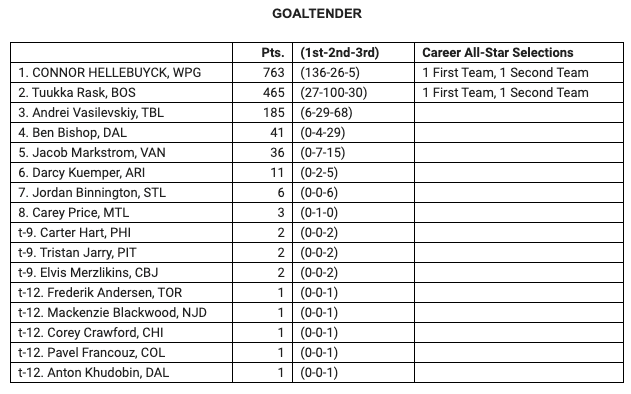 All-Star Team Goaltender Voting 2019-20
All-Star Team Goaltender Voting 2019-20Finally, there are the goaltenders. Surprisingly, Markstrom, who finished fourth in Vezina voting, finished fifth in All-Star voting behind Ben Bishop. Markstrom actually received more Second Team votes than Bishop, but far fewer Third Team votes.



.JPG;w=120;h=80;mode=crop)
